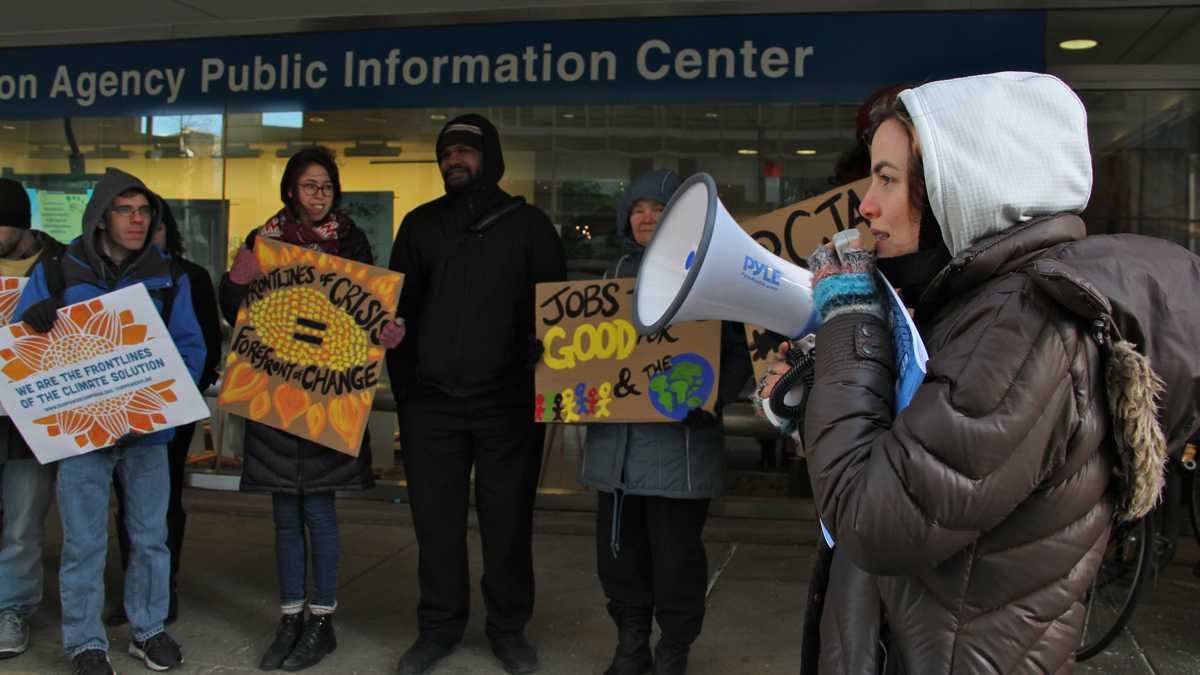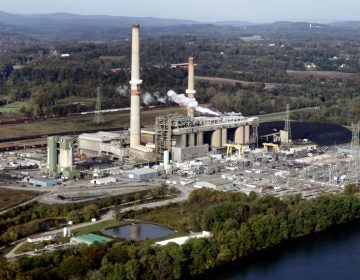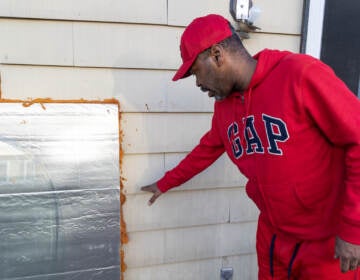Philadelphia’s protestors must embrace a diversity of causes, including environmental justice

Demonstrators from the Climate Justice Alliance are shown rallying outside the Environmental Protection Agency in Center City in January 2016. (Emma Lee/WHYY)
As a public health advocate, it can be difficult to situate environmental issues in the larger progressive struggle. Today’s activists would benefit from leadership that embraces many social justice causes while continually challenging corporate misinformation on the availability and necessity of fossil fuels.
After attending the Women’s March on Philadelphia, I looked back at Philadelphia’s history of public demonstrations. The Million Woman March in 1997 and Cecil B. Moore’s seven-month, 17-day picket line to desegregate Girard College in 1965 loom largest. Girard College finally admitted minority students in 1968 and, 30 years later, the Million Woman March saw mass incarceration as a more covert, but arguably more violent, form of oppression directed at African Americans. Only in the last decade has the prison population stopped increasing (per capita) since it began skyrocketing in the early 1970s. On Oct. 25, 1997, Congresswoman Maxine Waters delivered what is now known as the “I Speak Today” address as she continued to press for an investigation into the Central Intelligence Agency’s involvement in cocaine trafficking.
Given the broad strokes of President Trump’s racism, sexism, xenophobia, homophobia, and transphobia in addition to his larger class war against those who depend on Obamacare and Medicaid, the diversity of causes present at current demonstrations is understandable and necessary. As a public health advocate, it can be difficult to situate environmental issues in the larger progressive struggle. Rev. Linda Noonan of Chestnut Hill United Church joined Clean Air Council’s effort at the Women’s March, concisely aggregating concerns:
“Our country’s reluctance to act on climate change disproportionately harms the most vulnerable — people living in poverty, women, children, the medically fragile, and people of color. Our climate ties us in, as Dr. Martin Luther King says, ‘a single garment of destiny.’ All our lives depend on environmental justice.”
With recent airport protests in Philadelphia and across the country, concerned citizens have adeptly flexed around the most pressing assault on common decency at the moment, surely awaiting the next. Pennsylvania Senator Pat Toomey waited until last week Monday to support the “administration’s decision to increase vetting and temporarily suspend the admission of certain individuals from states that sponsor or provide safe havens to terrorists, or are too weak to prosecute terrorists within their borders.”
Toomey’s Philadelphia office has become a popular location on Tuesday afternoons. Every week an increasing number of Pennsylvanians are demanding the senator hold a town hall event in Philadelphia to respond to their concerns. Toomey’s anti-tax, anti-education, anti-environment, anti-choice platform is clearly out of step with Philadelphia’s needs as well as his own Senate responsibilities. He chairs the Financial Institutions and Consumer Protection Senate subcommittee, but during Toomey’s tenure, no bill has emerged from this subcommittee. He also chairs a subcommittee on health care while attempting to repeal the Affordable Care Act.
Toomey’s subcommittee is an accurate picture of current consumer protections, but the latitude of causes championed in our streets, train stations, and airports should all fall under this category. Many things we take for granted, like seatbelts in automobiles, exist because of consumer protection advocates. We all consume electricity and energy. As long as you’re breathing, you’re also consuming the resultant pollution, leading to Philadelphia’s one-in-four childhood asthma rate. Caroline Edwards, neonatal nurse practitioner at Thomas Jefferson University Hospital and Nemours Hospital for Children, participated in the Women’s March and further illuminated air pollution’s disproportionate effect on women:
“According to the Centers for Disease Control, compared to male asthma patients, women with chronic asthma also face extra challenges due to menstrual cycle, pregnancy, and menopause. Changing estrogen levels can lead to an inflammatory response, which can bring on asthma symptoms. Recent research has also suggested that women with asthma may have greater difficulty becoming pregnant than women without the respiratory condition.”
Philadelphia is home to the largest oil refinery, and one of the largest pollution sources, on the East Coast. On Oct. 17,1979 in Washington, D.C., consumer groups joined unions like the United Auto Workers (UAW) and International Association of Machinists (IAM) because, in the words of one retired Philly UAW member, “we’ve got to stop these big oil companies.”
Organizers held teach-ins prior to the rally, including one at the University of Pennsylvania. Ed Rothschild of Energy Action told Penn students, “big oil is an energy dope pusher.” Rothschild accused major oil companies of exploiting conflict in the Middle East, specifically the 1979 Iranian Revolution, to raise fossil fuel prices. Trump and Toomey’s jingoism serves the same purpose.
The leaders of “Big Oil Day,” including major labor unions under the umbrella of the Citizen-Labor Energy Coalition (CLEC), advocated for a nationalization of fuels with price controls in place to protect consumers and encourage conservation. CLEC was formed after IAM President William Winpisinger recommended the American Federation of Labor – Congress of Industrial Organizations (AFL-CIO) embrace parallel campaigns for race, gender, and environmental justice.
As early as 1977, Winpisinger cautioned that the “’the labor movement is drifting to the right along with everybody else.” Many unions within the AFL-CIO did not follow him to CLEC, but Winpisinger remained “a new breed of labor leader” (in the words of 60 Minutes) while serving on the AFL-CIO’s executive board until his retirement.
Today’s activists would benefit from an organization like CLEC, with leaders like Winpisinger, who embraced many social justice causes while continually challenging corporate misinformation on the availability and necessity of fossil fuels. Whenever poor people, immigrants, or minorities are under attack, the equitable administration of essential goods and services, like energy and health care, is also in danger.
—
Russell Zerbo has been the advocacy coordinator at the Clean Air Council since 2012. He works with Philly residents to report illegal burning, dumping, and drainage issues. He currently serves on the Philadelphia Health Department’s Climate Change and Health Advisory Group and works within the Philadelphia Health and Environment Ethnography Lab based out of Drexel University. Reach him at rzerbo@cleanair.org.
WHYY is your source for fact-based, in-depth journalism and information. As a nonprofit organization, we rely on financial support from readers like you. Please give today.




